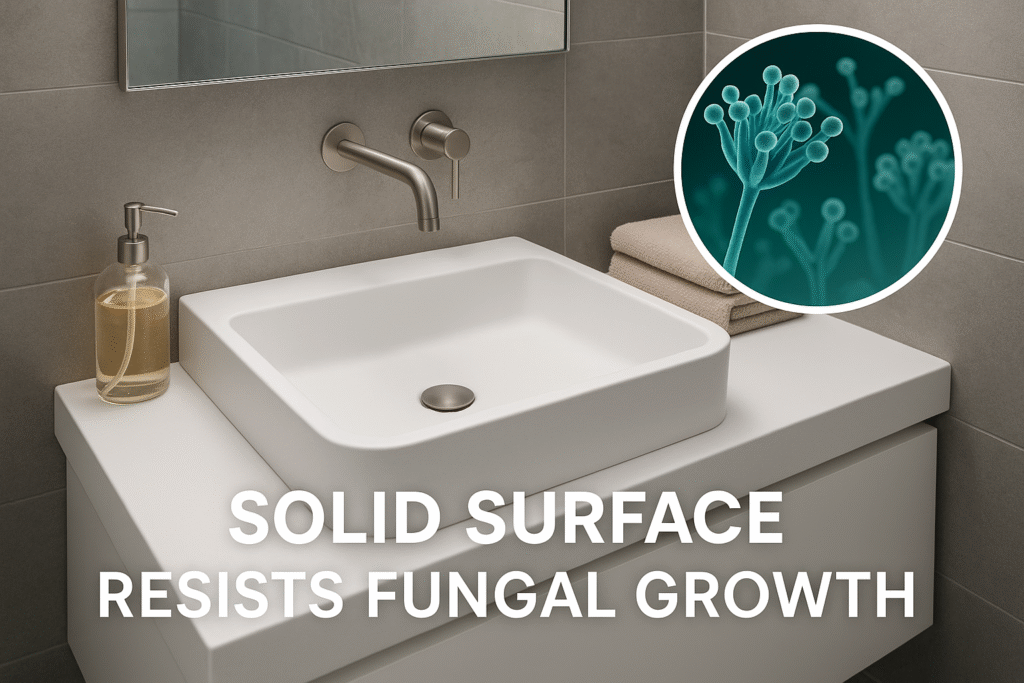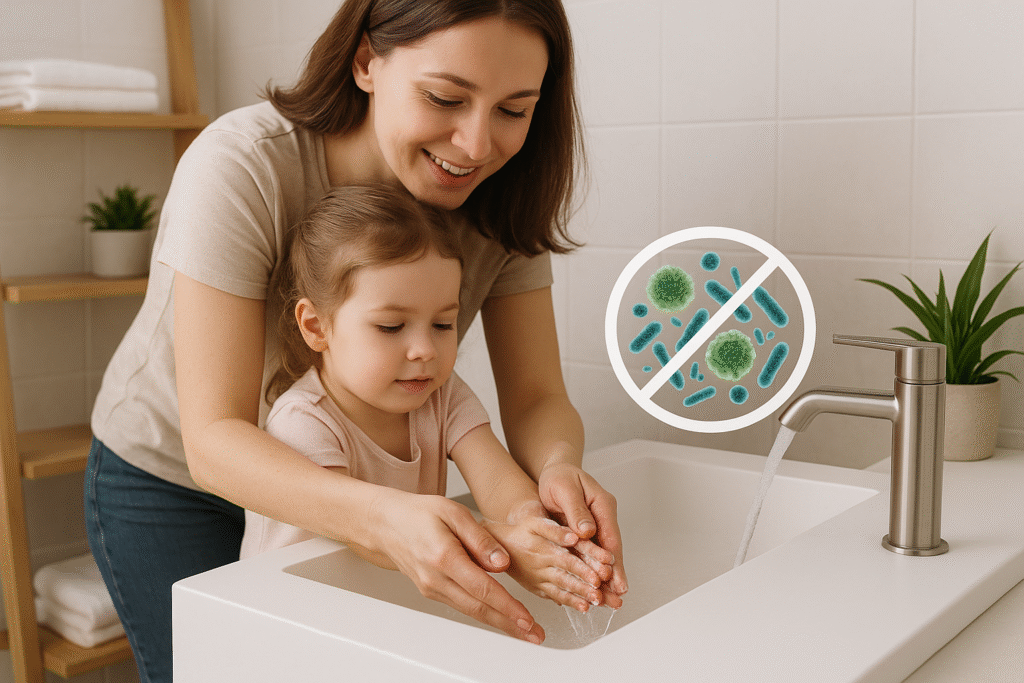Bathrooms are one of the most humid spaces in any building, whether in private homes, hotels, or high-traffic commercial restrooms. This constant exposure to moisture makes sinks and basins especially vulnerable to mold and bacterial growth. But in recent years, solid surface basins have gained popularity in the hospitality, residential, and healthcare sectors thanks to their proven ability to resist mold and deliver long-lasting hygiene.


This article explores the science behind why solid surface basins resist mold, the antibacterial properties that make them superior to traditional materials, and why developers, architects, and hotel managers are increasingly specifying them in 2025 bathroom projects.
The Problem with Mold in Bathrooms
Mold thrives in damp, humid environments where organic matter can serve as food. In bathrooms, materials such as ceramic grout, natural stone, or low-quality laminates are often porous, which means water can seep in and create the perfect breeding ground for microorganisms. Once mold colonies take hold, they not only cause unsightly stains and foul odors but also present serious health risks, particularly for people with asthma, allergies, or compromised immune systems.
This is why building professionals are increasingly prioritizing antibacterial bathroom surfaces—materials that are resistant to mold, mildew, and bacterial growth.
What Makes Solid Surface Different?
Solid surface is an advanced composite material made from alumina trihydrate (ATH) and acrylic resins, resulting in a smooth, non-porous surface. Unlike natural stone or ceramic tiles with grout lines, solid surface basins are seamless and uniform, which eliminates the small gaps and pores where mold usually thrives.
Key Mold-Resistant Properties of Solid Surface:
- Non-Porous Structure – Water and bacteria cannot penetrate, which makes cleaning much easier.
- Seamless Integration – Many basins can be integrated into countertops without visible joints, reducing dirt traps.
- Antibacterial Properties – The acrylic matrix naturally resists bacterial colonization.
- Easy to Clean – A simple wipe with mild soap and water is often enough to maintain hygiene.
- Durability in High Humidity – Unlike wood or laminate, solid surface does not swell or warp in damp conditions.
The Science Behind Antibacterial Surfaces
Antibacterial performance is not just marketing—it’s based on material science. In solid surface:
- Smooth Surfaces Reduce Microbial Adhesion
Bacteria and mold spores require micro-pores or rough surfaces to attach and grow. Solid surface basins have ultra-smooth finishes, leaving little room for microorganisms to latch onto. - Moisture Resistance
Since the material is non-absorbent, there’s no retained water to sustain microbial growth. This is a key advantage over porous ceramics or untreated natural stone. - Optional Antimicrobial Additives
Many manufacturers now integrate antimicrobial agents into the resin during production, further enhancing defense against bacteria.
Scientific studies have shown that non-porous materials like solid surface and stainless steel harbor significantly fewer microorganisms compared to porous surfaces. This is particularly critical in high-traffic environments such as hotels, hospitals, and airports.


Why Architects and Contractors Prefer Solid Surface Basins
1. Hygiene Compliance
For hotels, hospitals, and public restrooms, hygiene is not optional—it’s a regulatory requirement. Solid surface helps meet health and safety standards more efficiently than porous materials.
2. Design Flexibility
Solid surface can be molded into wall-hung sinks, trough sinks, or integrated countertop basins, making it versatile for both compact apartments and luxury hotel suites.
3. Longevity & Low Maintenance
Unlike ceramic sinks that may develop cracks where mold forms, solid surface is repairable and resistant to long-term water damage.
4. Sustainability
Many manufacturers now produce eco-friendly solid surface with recycled content, which appeals to developers committed to green building certifications (LEED, BREEAM, WELL).
Applications in Hospitality and Commercial Bathrooms
Hotels in tropical or coastal regions—where humidity levels are high—especially benefit from solid surface basins. These basins resist mold even in spa areas, beachfront resorts, and wellness centers, where moisture exposure is constant.
In high-traffic commercial bathrooms such as airports, shopping malls, and universities, mold resistance means reduced cleaning time, fewer chemical disinfectants, and longer product lifespans—all of which translate to cost savings for operators.
Comparison: Solid Surface vs. Other Basin Materials
| Material | Mold Resistance | Maintenance | Durability in Humidity | Hygiene Rating |
|---|---|---|---|---|
| Solid Surface | Excellent (non-porous, antibacterial) | Easy | High | ★★★★★ |
| Ceramic | Moderate (porous grout lines) | Medium | Medium | ★★★ |
| Natural Stone (Marble) | Poor (high porosity) | High | Low | ★★ |
| Stainless Steel | Good | Easy | High | ★★★★ |
| Laminate | Poor (swells in moisture) | High | Low | ★★ |
FAQ: Solid Surface and Mold Resistance
Q1: Do solid surface basins need special cleaning products?
No. Mild soap and water are usually sufficient. Harsh cleaners are unnecessary because mold does not penetrate the material.
Q2: Can mold grow on solid surface at all?
Mold may grow on the surface if water and organic matter are left uncleaned, but it cannot penetrate or thrive inside the material. Regular wiping eliminates the risk.
Q3: Are solid surface basins suitable for tropical and seaside hotels?
Yes, they are ideal. The non-porous structure resists both mold and saltwater damage, making them perfect for coastal resorts.
Q4: How do solid surface basins compare to ceramic ones?
Ceramic basins are durable but their grout lines and microscopic pores can harbor mold. Solid surface provides a seamless alternative with superior hygiene.
Conclusion: A Smarter Choice for Hygienic Bathrooms
As bathrooms continue to evolve into spaces that balance design, wellness, and sustainability, the demand for hygienic and mold-resistant fixtures will only increase. Solid surface basins stand out as the superior option, offering a combination of antibacterial performance, durability, and design versatility unmatched by other materials.
For hotels, developers, and contractors working in humid or high-traffic environments, solid surface is more than just a stylish material—it’s a long-term investment in health, safety, and guest satisfaction.
If you’re exploring solutions for your next project, discover more about Kingkonree’s solid surface basins at kkrbath.com, where mold resistance meets luxury design.




